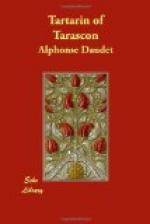It follows that, every Sunday morning, Tarascon flies to arms, lets loose the dogs of the hunt, and rushes out of its walls, with game-bag slung and fowling-piece on the shoulder, together with a hurly-burly of hounds, cracking of whips, and blowing of whistles and hunting-horns. It’s splendid to see! Unfortunately, there’s a lack of game, an absolute dearth.
Stupid as the brute creation is, you can readily understand that, in time, it learnt some distrust.
For five leagues around about Tarascon, forms, lairs, and burrows are empty, and nesting-places abandoned. You’ll not find a single quail or blackbird, one little leveret, or the tiniest tit. And yet the pretty hillocks are mightily tempting, sweet smelling as they are of myrtle, lavender, and rosemary; and the fine muscatels plumped out with sweetness even unto bursting, as they spread along the banks of the Rhone, are deucedly tempting too. True, true; but Tarascon lies behind all this, and Tarascon is down in the black books of the world of fur and feather. The very birds of passage have ticked it off on their guide-books, and when the wild ducks, coming down towards the Camargue in long triangles, spy the town steeples from afar, the outermost flyers squawk out loudly:
“Look out! there’s Tarascon! give Tarascon the go-by, duckies!”
And the flocks take a swerve.
In short, as far as game goes, there’s not a specimen left in the land save one old rogue of a hare, escaped by miracle from the massacres, who is stubbornly determined to stick to it all his life! He is very well known at Tarascon, and a name has been given him. “Rapid” is what they call him. It is known that he has his form on M. Bompard’s grounds — which, by the way, has doubled, ay, tripled, the value of the property — but nobody has yet managed to lay him low. At present, only two or three inveterate fellows worry themselves about him. The rest have given him up as a bad job, and old Rapid has long ago passed into the legendary world, although your Tarasconer is very slightly superstitious naturally, and would eat cock-robins on toast, or the swallow, which is Our Lady’s own bird, for that matter, if he could find any.
“But that won’t do!” you will say. Inasmuch as game is so scarce, what can the sportsmen do every Sunday?
What can they do?
Why, goodness gracious! they go out into the real country two or three leagues from town. They gather in knots of five or six, recline tranquilly in the shade of some well, old wall, or olive tree, extract from their game-bags a good-sized piece of boiled beef, raw onions, a sausage, and anchovies, and commence a next to endless snack, washed down with one of those nice Rhone wines, which sets a toper laughing and singing. After that, when thoroughly braced up, they rise, whistle the dogs to heel, set the guns on half cock, and go “on the shoot” — another way of saying that every man plucks off his cap, “shies” it up with all his might, and pops it on the fly with No. 5, 6, or 2 shot, according to what he is loaded for.




